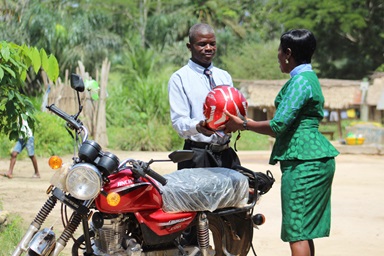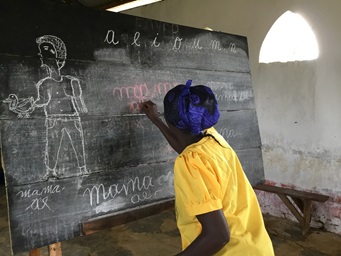Representatives from The United Methodist Church in Nigeria said the Social Principles have given them the opportunity to put their faith into action for the transformation of the world.
Thirty-five representatives from the Nigeria Episcopal Area attended the eighth Social Principles discussion organized by the United Methodist Board of Church and Society. The event was held March 24-26 after a scheduled November meeting was postponed due to the Ebola outbreak in West Africa. Representatives were from the three annual conferences of the Nigeria Episcopal Area West Africa Central Conference.
The discussion focused on three questions:
- What role do the current Social Principles play in enhancing the mission and ministry of The United Methodist Church?
- How much or how well have the current Social Principles served to empower mission and Ministry in your geographical area?
- What might globally relevant Social Principles look like?
The Rev. Eunice Iliya, the superintendent of the Southern Nigeria Annual Conference, said "putting the Social Principles into use will transform many lives in Nigeria." She explained that reaching out to people in “our ministry of presence and healing will help in restoring hope in our broken communities.” She also believes teaching the Social Principles from the pulpit, Bible studies classes and small fellowship group meetings will bring desired transformation in lives and the nation.
"The Social Principles have raised the consciousness of my annual conference on matters of faith and practice," said the Rev. Eli Yakku, superintendent of the Central Nigeria Conference, adding that the church has an obligation to care for God’s creation.
The Rev. Isa Duna Audu, the representative of the superintendent of the Northern Nigeria Conference, said, "The Social Principles encourage people to speak for those whose rights have been denied and also helps us to understand that all humanity is equal before God, and there is no reason to deny anyone their fundamental human rights."
Equal education for girls and boys
For example, The United Methodist Church in Nigeria has condemned the activities of the Islamic militant group Boko Haram, especially the abduction of more than 200 schools girls in Chibok Borno State, Nigeria. The church has also been at the forefront in advocating for equal education for all Nigerian children, both male and female. This advocacy resulted to the establishment of the United Methodist Central Nigeria junior seminary and orphanage, all in Jalingo to provide education for children, paying attention to gender equality.
The focus on human rights comes at a time when the northeastern part of Nigeria has been under constant attack by Boko Haram, which has targeted churches, schools and government institutions in an effort to establish an Islamic caliphate in the northeastern part of Nigeria. The group has been responsible for the deaths of more than 50,000 people in Nigeria since 2009.
The whereabouts of the kidnapped girls is still unknown. Violence by Boko Haram has displaced more than 300,000 within and outside Nigeria.
Bishop John Wesley Yohanna, the leader of the Nigeria Episcopal Area, said during closing worship "the consultation offered an opportunity to participate fully in the dialogue that will form the legislation in future annual conferences and the 2016 General Conference."
The bishop stressed that the mission of The United Methodist Church is to transform the world, which he said can only be done if the Social Principles are succinct, theologically founded and globally relevant.
Church strives to be instrument of peace
The meeting also came as Nigeria held its presidential and National Assembly elections. Nigeria, a country with more than 160 million people, faces challenges including a high level of poverty and a dilapidated infrastructure. The candidate of the All Progressive Congress, Gen. Mahammadu Buhari, was declared winner of the presidential election over the outgoing president Goodluck Ebele Jonathan, candidate of the ruling party.
The election was conducted peacefully in most parts of Nigeria, with the exception of places like Gombe, Bauchi, Enugu, Yobe and Borno States, where bombs have been reported.
"Our team went to Nigeria during a very anxious period in their history. What we found was a church striving to be an instrument of God's peace even in the midst of violence," said Clayton Childers, Church and Society’s director of conference relations.
The Rev. Neal Christie, Church and Society’s assistant general secretary for education and leadership formation, said the Social Principles are the positions of the United Methodist on social issues affecting church and society. Christie said the principles call members of the denomination to a prayerful, studied dialogue of faith and practice.
The rationale for the consultation was to create a space for honest conversation, listen to stories and experiences of United Methodists living around the world and gather honest feedback on the Social Principles, Christie said.
The Rev. Fitzgerald Reist II, secretary of the General Conference, said further discussion about the worldwide nature of the church will take place when more than 800 delegates gather in Portland, Oregon, for the 2016 General Conference. Six consultations on the Social Principles were held in the central conferences. In addition to Abuja, consultations were held in the Philippines, the Czech Republic, Democratic Republic of Congo, and Mozambique. Two were held in the United States.
Emmanuel is field organizer for the United Methodist Board of Church and Society. Contact UMNS at [email protected] or 615-742-5400.
Like what you're reading? Support the ministry of UM News! Your support ensures the latest denominational news, dynamic stories and informative articles will continue to connect our global community. Make a tax-deductible donation at ResourceUMC.org/GiveUMCom.




